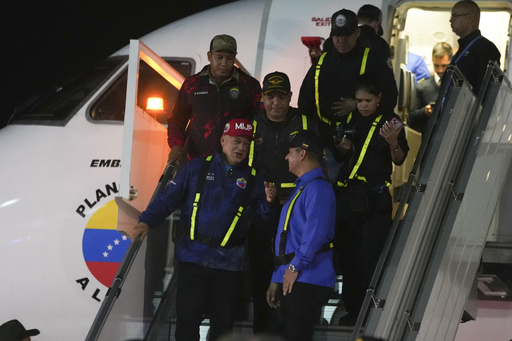
Two planes from Venezuela returned home on Monday carrying approximately 190 Venezuelans who were deported from the United States. This event indicates a potential improvement in relations between the two countries, which have historically been at odds, and marks a notable achievement for President Donald Trump in his endeavors to encourage other nations to accept their nationals back.
Deportation flights to Venezuela had been suspended for several years, with a brief resumption noted during the Biden administration in October 2023. Since 2021, there has been a significant increase in the number of Venezuelans arriving at the U.S.-Mexico border, making them one of the largest groups entering the U.S. unlawfully. The challenge of Venezuela not accepting these deportees has posed a significant hurdle for the U.S. immigration system.
The recent resumption of flights appears to have been facilitated by the visit of Richard Grennell, an envoy from Trump, who met with officials in Caracas earlier this month. The White House announced this development on the social media platform X, emphasizing that these deportation flights were implemented under Grennell’s supervision.
The arrival of the Conviasa flights back in Caracas from Fort Bliss, a U.S. military base in El Paso, Texas, received enthusiastic coverage from Venezuelan media outlets. In response to the event, Venezuelan President Nicolás Maduro expressed hope for a world characterized by “peace, understanding, dialogue, and cooperation.”
In a prior statement, the Venezuelan government responded to claims regarding the presence of members of the Tren de Aragua gang in the U.S., describing such narratives as “ill-intentioned” and “false.” The government asserted that the majority of Venezuelan immigrants are hardworking, decent individuals and criticized U.S. officials for attempting to tarnish the image of Venezuela.
The flights occurred shortly after the initial deportation of immigrants to Guantanamo Bay, Cuba, and followed agreements made by U.S. Secretary of State Marco Rubio with El Salvador and Guatemala to take in individuals who do not hold citizenship in those countries.
Additionally, a federal judge in New Mexico acted over the weekend to prevent the transfer of three Venezuelan men to Guantanamo Bay. Their attorneys argued that these individuals “fit the profile” marked for detention, claiming that their clients had been wrongly accused of connections with the Tren de Aragua gang while detained in the El Paso region.
Following Grennell’s diplomatic mission, Trump noted that the Maduro government had consented to accept “all Venezuelan illegal aliens encountering difficulties in the U.S., including members of Tren de Aragua,” and had agreed to cover the costs associated with their transport. At that time, six Americans held in Venezuela were also released.
The Venezuelan government has not made any statements regarding potential future flights in its announcement on Monday.

